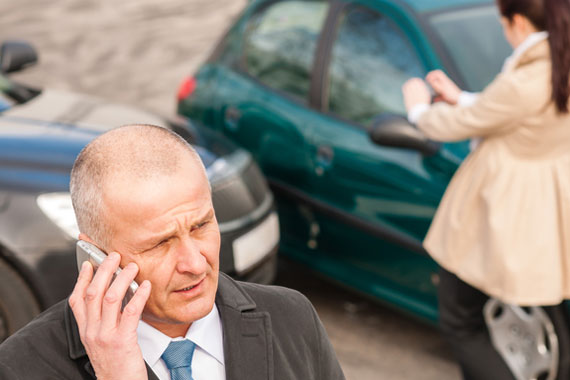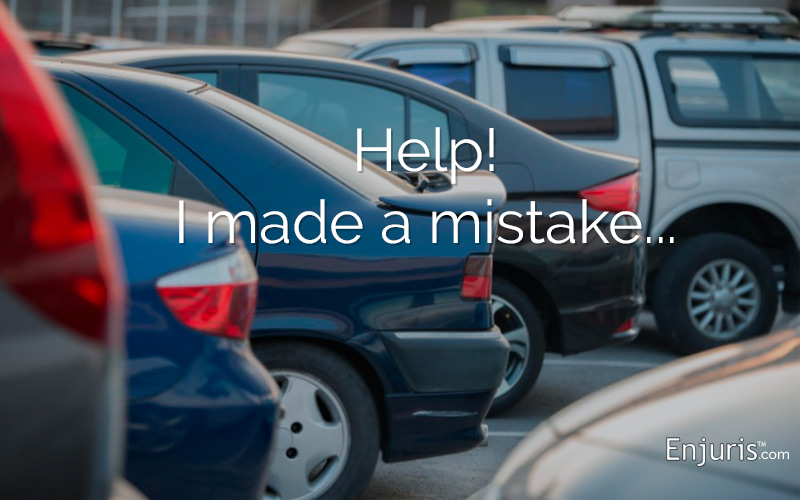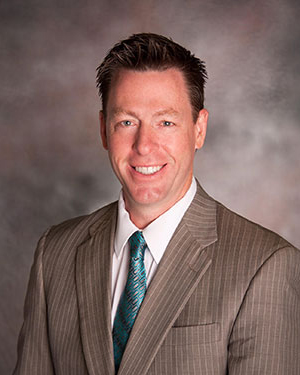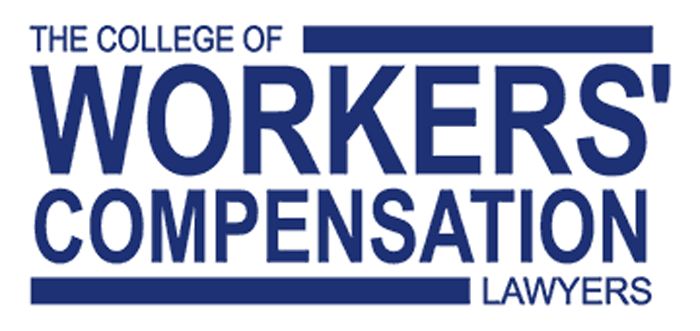A car crash can leave you confused, hurt and upset. In the aftermath, it’s easy to let your emotions get the best of you and do or say something you shouldn’t—or make a critical error of judgment. By knowing what mistakes to avoid following a wreck, you can be better prepared to take the right to protect your rights and make sure that you don’t inadvertently derail your future claim for compensation.
Here at Finderson law, we’ve represented hundreds of car crash victims in Fort Wayne and across the state of Indiana for many years. In this time, we’ve had countless individuals come to us asking for help after discovering that they made a critical error or mistake that jeopardized their claim. While some mistakes can be corrected and overcome with our help, it’s best if you never make these same mistakes in the first place.
Here are the most common and critical mistakes we’ve seen clients make in the aftermath of an auto (or traffic) crash:


Mistake #1: Not Reporting the Accident to Police
No matter how minor a crash may seem—and regardless of whether or not you feel injured—it’s essential that you call the police after a collision. Not only can police (and other law enforcement officers) help accident victims get the care they need and redirect traffic while the wreckage is cleared, but responding officers will also:
- Investigate the crash
- Take pictures
- Talk to all involved parties and witnesses
- Gather key evidence that may help determine liability
- Issue an official accident report to help establish fault
- Provide documentation of the accident damages and injuries
In Indiana, you are required by law to report any car accidents that involve injury, death, entrapment of another person, or damage to property (excluding the vehicles involved). You have 10 days from the date of your accident to submit an accident report to the Bureau of Motor Vehicles. Failing to report the accident can result in your license being suspended, having your registration revoked and being charged with a Class C misdemeanor.
However, even if the accident was seemingly minor, involving no injuries and only minimal damage to the vehicles, it may still be in your best interests to notify the police and file an accident report. While doing so may be a hassle at the time, it might protect you down the road if you later discover that your injury was more severe than you realized and wish to file an insurance claim—or if another person tries to claim that the damage was more extensive than it actually was.
According to Indiana law, motorists are required to report a car accident when:
- A wreck traps someone in a vehicle and/or results in injuries or death.
- A crash causes at least $1,000 in property damage.
- An accident involves unoccupied or unattended property, and the owner cannot be tracked down. If the crash involves a parked vehicle and the owner cannot be found, leaving a note with your name, address and registration number (rather than calling police) is legally acceptable.
These crash reports can be filed with either local police (in municipalities) or a county sheriff (outside of city boundaries).
Mistake #2: Fleeing the Crash Scene
People often experience shock and panic when they’re in an auto accident. In this moment of panic, some drivers make the poor decision to leave the crash scene. You should always stop your car and assess the scene if you were involved in a collision, even if nobody appears to be injured.
Fleeing the scene of an accident that you are involved in is a misdemeanor or felony in Indiana, depending on the nature and severity of the collision. For instance, if someone was killed and you fled, you may be charged with a Level 5 felony. Even if nobody was hurt, you can still be charged with a Class B misdemeanor resulting in jail time and fines.
Aside from the criminal penalties of a hit and run, driving away from a crash is irresponsible and inhumane. Someone may be hurt and require medical assistance.
If you hit a parked car and cannot locate the owner after making reasonable attempts, Indiana law requires that you call 911 and report the accident.
Here’s what you need to know (and do) if this happens to you…
Mistake #3: Apologizing After the Crash or Admitting Fault
We understand that many people have a natural urge to express regret when a crash happens by saying “I’m sorry,” but it’s important to understand that any apologies and admissions of fault can serve as a basis to argue that you are liable for the crash. As a result, these statements can hurt your claim, possibly reducing its value or preventing you from being able to collect compensation for your losses.
After an accident, be very careful about what you say to others. Although you may want to express compassion or sympathy to other parties involved, you can do so without saying “sorry” or accepting any blame for the wreck.
Mistake #4: Getting Angry and Losing Control
It’s understandable that you’d be upset, angry and frustrated following a wreck, especially if it was the other person’s fault. Tension often runs high in such a stressful situation. However, don’t lose control of your emotions and try to avoid taking your anger out on people at the crash scene as this won’t help your future case and you may say something you regret.
Focus on making sure everyone involved in the crash receives the help they need, providing all the info you can to the responding officer and gathering your own evidence.
Mistake #5: Leaving the Crash Scene Without Taking Pictures or Video
As the saying goes, “a picture is worth a thousand words.” Consequently, photos and video can go a long way to proving fault and liability, and ultimately establishing the value of a claim by depicting the extent of the damage.
You don’t need to buy a high-resolution camera to store in your car in the event of a crash. Most people have the perfect device to take accident photos and video right in their pockets. Many of today’s smartphones come equipped with powerful cameras that can easily capture important crash details.
Before you leave, be sure to take pictures or video with your phone—or ask someone else to do so and send them to you if you are unable to yourself because you are hurt or your phone was broken in the collision.
The pictures or video you take can capture many important details and evidence about the accident, such as:
- The weather conditions at the time of the crash
- The road conditions surrounding the accident
- The point(s) of impact associated with the collision
- The nature and severity of the damage caused by the wreck
Mistake #6: Forgetting to Collect Information from the Other Driver and Witnesses
In addition to photos and video, another important piece of information to gather at the accident scene is the personal and insurance information of the other driver (and anyone else involved in the wreck). Be sure to collect the other driver’s:
- Full name
- Current address
- Phone number
- Driver’s license number
- Vehicle registration number
- Insurance information (name of company and policy number)
You should also collect the contact information (name, address and phone number) of anyone who witnessed the accident—including pedestrians, cyclists and other drivers. You don’t need to get a statement from them just yet (as that’s the job of the responding police officer), but it’s important to write down their information in case you or your attorney need to corroborate your version of events later on. Witness testimony is especially important if the other driver or their insurance company refuses to take the blame and is uncooperative.
Mistake #7: Not Seeking Immediate Medical Attention
Whether you are treated by an EMT at the crash scene, are transported to the emergency room or visit your doctor shortly after a wreck, getting examined by a qualified medical professional as soon as possible following a collision is key to documenting the extent of your crash-related injuries. Even if you “feel fine,” it’s very important that you visit your doctor for a check-up to make sure that there aren’t any hidden or underlying injuries.
Certain common car crash injuries, such as whiplash, back pain and internal injuries, may not become evident until days or even weeks following the incident, while other pain may be masked by the adrenaline and shock you experience immediately after the wreck.
If you wait too long after the accident to see a doctor (or you don’t see a physician at all), you’re giving insurance companies (and maybe others) a free pass to argue that:
- The crash did not cause your injuries, but rather some other non-related event did, or
- Even if the crash caused the injury, your injuries were worsened because you didn’t seek medical attention right away.
If you want to see your primary care doctor, simply call and notify them that you were involved in a car accident and would like to schedule a checkup as soon as possible. They should know what to do from there and what to look for.
Mistake #8: Accepting the First Settlement Offer and Talking to the Other Insurance Company
It’s a common practice for insurance adjusters to “lowball” car accident claims in the beginning in an effort to settle the case early before the accident victim knows the full extent of their injuries. Before you agree to a settlement offer from an insurer, it’s important to consult with a car accident attorney who can review your case to determine if the offer is fair.
Also, never speak to another person’s insurance company without a lawyer as they will try to use your own words against you. Remember, the insurance adjuster’s goal is to minimize how much their company has to payout by convincing you to settle your claim for as low as possible and using any excuse to reduce or deny your settlement.
Mistake #9: Failing to Notify Your Own Insurance Company
Aside from calling the police, your own auto insurance company should be one of the first phone numbers you dial following an auto accident. It’s important to notify your insurance company that you were involved in a crash, even if it wasn’t your fault, as most insurance policies require the claimant to notify the insurer in a timely manner. If you delay, your insurance company may use that as grounds to deny coverage under your policy.
When you call your insurance company to notify them, you don’t have to be detailed in explaining what happened. Since the accident just occurred, it’s okay (and even in your favor) to be general and avoid the specifics until you’ve spoken with an accident attorney.
Mistake #10: Not Contacting a Lawyer to Learn About Your Rights and Options
While hiring a lawyer isn’t necessary for all auto accidents (particularly if the crash was minor and involved no injuries and little property damage), a personal injury attorney can be an invaluable advocate on your behalf after a serious wreck. A knowledgeable lawyer can inform you of your rights, explain the recovery process and help you take the right action to position your claim for success.
Without a lawyer in your corner, you can run the risk of:
- Making other mistakes that could devalue your claim.
- Missing out on the full compensation you deserve by accepting a low settlement offer.
- Lacking the financial resources you need to cover future medical treatments and fully heal from the crash.
A study by the Insurance Research Council found that the average insurance payout for clients who hire an attorney is 3.5 TIMES LARGER than for those who don’t hire one. Think about that – three-and-a-half times larger on average.
Don’t Compromise Your Recovery: Contact a Fort Wayne Car Accident Lawyer
If you or someone you love was hurt in an Indiana auto crash, contact an experienced Fort Wayne car accident lawyer at Finderson Law today to get answers about your potential claim. Contact us to set up your free consultation where you’ll discover more about your legal options for financial recovery.
Let us show you how our representation can make all the difference in your claim.
Our history of providing the highest quality legal services – and delivering exceptional results – in challenging personal injury and car accident cases has earned us a 5-star rating on Facebook.
From offices in Fort Wayne, we are proud to represent clients throughout Allen County and the state of Indiana.
REVIEWS FROM OUR CLIENTS
Great to work with. Went above and beyond to help us. Very professional and personable. They cared about me and getting done what was needed. Would highly recommend this firm. - D.P.
Always on top of the process and keeps in contact. Communication to me is key regardless if they are making progress or not and they were always answering the phone or returning calls promptly and answering any questions along the way. Top notch and while I hope to never use them again, I highly recommend them. Excellent and phenomenal! - H.H.
Roger went above and beyond for me and got me the results I needed. I'm extremely satisfied with how things turned out! Hopefully, I will not have to visit the office again; but, if I do need a lawyer, I know where to go! - T.







 744 E Till Rd, Suite 102
744 E Till Rd, Suite 102
